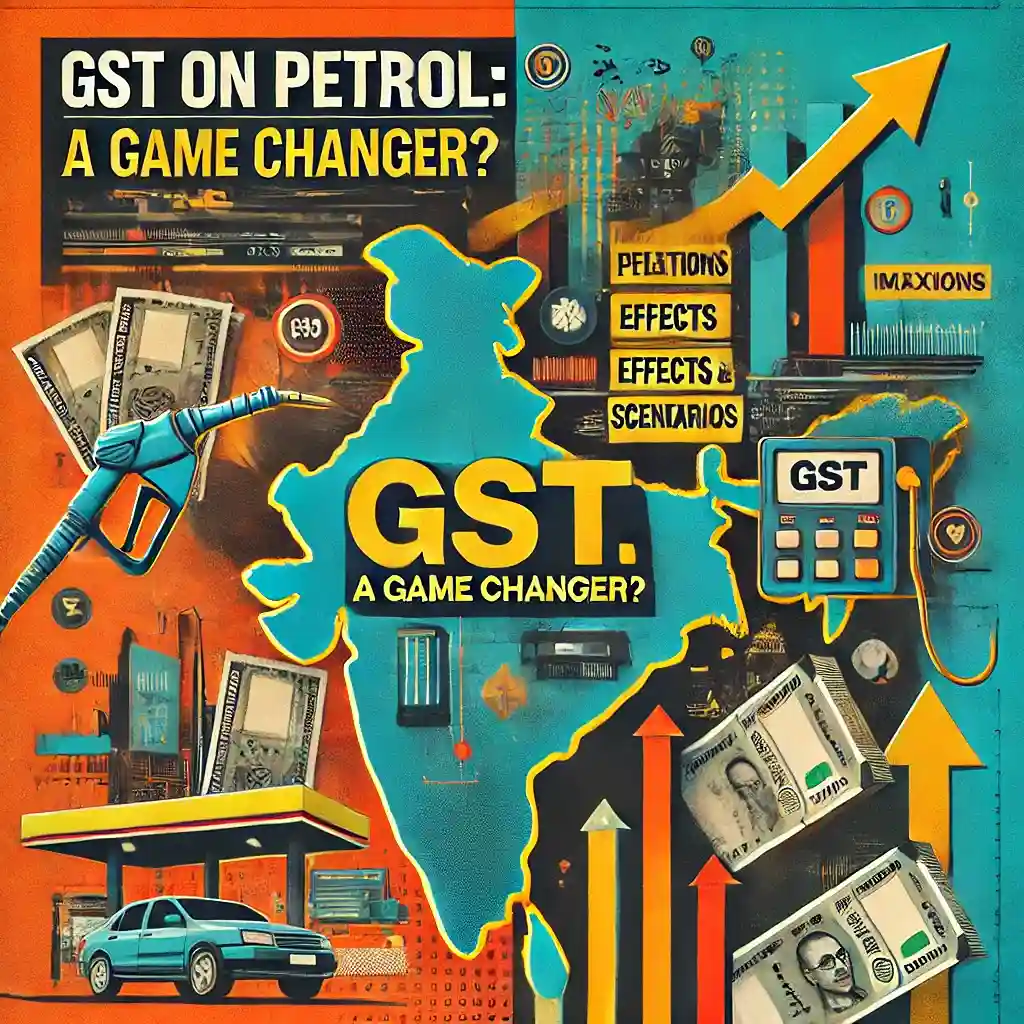Petrol and Petroleum products are the bases or in other word lifeline of India's economy. Fueling transportation, logistics, and industrial operations, without this is not possible currently in present without Petrol and Petroleum.
But, even of their crucial role, they are not in the Goods and Services Tax (GST) framework (a subject of much debate between the Centre and state governments). This article delves into the reasons for this exclusion, the potential outcomes of their inclusion, and the broader implications, impacts for the economy.
Why GST on Petrol and Petroleum Products ?
A key and the most important reason lies for the GST on Petrol and Petroleum Products is the significant revenue dependence of state governments on taxes from petrol and diesel. The Value Added Tax (VAT) collected on these products constitutes a large chunk of state revenues, providing them with both financial resources and
autonomy to adjust tax rates based on their requirements. Introducing GST would standardize these rates, taking away the states' flexibility and raising concerns over their fiscal independence.
Adding to the complexity is the current revenue-sharing model between the Centre and states. The Centre collects excise duty while states levy VAT, and a shift to GST would require a restructured revenue-sharing agreement. States have expressed apprehensions about potential delays or inadequacies in compensation, as observed with GST revenue sharing for other goods.
Moreover, petroleum taxes currently yield exceptionally high revenues, with combined central and state taxes often exceeding 100% of the base price. Transitioning to GST, which caps tax rates at 28%, could significantly reduce these collections, posing a challenge to government finances. Lastly, governments argue that bringing petroleum products under GST could lead to short-term price adjustments, potentially triggering inflationary pressures.
Effects of Including Petrol and Petroleum Products Under GST
Incorporating petrol and petroleum products into the GST framework would likely bring about notable benefits, particularly for consumers and businesses. A rationalized tax structure could lower the overall tax burden, reducing fuel prices for end consumers. This would have a cascading effect, lowering transportation and logistics costs and making goods and services more affordable.
However, the impact on government revenue is a double-edged sword. While initial revenue losses are inevitable due to the lower GST rates, the long-term economic growth spurred by reduced costs and increased consumption could help offset these losses. Additionally, GST would eliminate regional price discrepancies, creating a unified market where fuel prices are consistent across the country. This would benefit industries, particularly those relying on inter-state operations.
Lower fuel prices under GST could also stimulate economic growth. Reduced input costs would encourage manufacturing and investment, boosting India's global competitiveness. Furthermore, GST's integrated framework could improve tax compliance and transparency, enhancing public trust in the tax system.
Effects of Excluding Petrol and Petroleum Products From GST
The exclusion of petroleum products from GST perpetuates several challenges. One of the most glaring issues is price volatility. States, having the authority to independently adjust VAT rates, often create significant price variations across regions, leading to unpredictability for consumers.
High fuel costs are another consequence. The combined taxes on petrol and diesel under the current system far exceed GST rates, burdening both consumers and industries. Businesses, in particular, suffer from the inability to claim input tax credits on fuel expenses, which increases operational costs and hampers competitiveness.
Excluding such major revenue-generating products also undermines the holistic intent of GST as a simplified and unified tax regime. This selective approach to tax reform slows down broader economic progress, leaving a fragmented and less efficient system in place.
What If GST Was Implemented on Petroleum Products?
The inclusion of petroleum products under GST could usher in a new era of economic efficiency. Fuel prices, subject to a standardized GST rate, would likely drop, benefiting consumers and industries alike. This reduction could also curtail inflationary pressures, as lower transportation costs would make goods and services more affordable.
A shift to GST would bring much-needed transparency to fuel taxation, offering consumers a clearer understanding of price components. Moreover, uniform pricing across the country would eliminate regional disparities, fostering a more integrated and competitive market.
However, implementing this change is not without challenges. Many rocks, problems are here too. Governments would need to establish effective systems to address potential revenue losses. Additionally, political disagreements and administrative hurdles could delay the transition, highlighting the need for planning and collaboration among stakeholders.
The Broader Economic Impact by GST implement on Petrol
The integration of petrol and petroleum products into GST would have far-reaching implications. Lower fuel prices could reduce transportation costs, curbing inflation and benefiting consumers across sectors. This would also provide a competitive edge to export-driven industries by lowering production costs.
Furthermore, GST is integrated framework which simplify tax compliance and reduce of tax doubling and further increament. This leads to improving overall efficiency in tax collection. However, shifting to this system would require substantial logistical and administrative efforts, both for governments and businesses.
Conclusion - GST on Petrol and Petroleum Products
The debate over including GST on Petrol and Petroleum Products is kind of a classic policy trade-off between revenue
requirements and consumer interests. While the benefits of lower prices, economic growth, and uniformity are compelling, the challenges of revenue losses and political complexities cannot be ignored. A phased approach, supported by this, could strike the right balance, ensuring that the costs and budget are properly handled.
India's journey toward comprehensive tax reform requires bold and collaborative decision-making. The inclusion of these critical products under GST has the potential to not only simplify taxation but also drive economic growth, making it a reform worth considering development.



add your comment